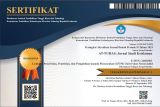Methodology of Scientific Reseacrh Programmes Imre Lakatos: Implikasi Terhadap Studi dan Pendidikan Islam
(1) * Ridhatullah Assya'bani


 (Sekolah Tinggi Ilmu Alqur'an (STIQ) Amuntai)
(Sekolah Tinggi Ilmu Alqur'an (STIQ) Amuntai) Indonesia
(*) Corresponding Author
AbstractThe development of the scientific world and human thought patterns are increasing, starting from something abstract to something real and can be proven. Along with these developments, positivistic epistemology has mastered the science and the study of the philosophy of science in almost all regions. Thus giving birth to new paradigms and discoveries. Even so, there are still several problems. With this remaining problem, it gave birth to thinkers in the twentieth century who wanted new studies in the philosophy of science, such as Karl R. Poper (1902-1994) with three main themes, namely, the issue of induction, problems and standards and problems of the third world, and Thoma S. Kuhn (1922-1996) came up with a revolutionary idea of science which was marked by the process of shifting the old paradigm to the new one. But in between, Imre Lakatos comes with the Methodology of Scientific Research Programs which contains several important elements, first, the Core Program (hard-core), which is the basis of the Lakatos methodology which is the initial assumption of research or scientific research that cannot be replaced or modified. Second, the protective circle (protective belt), this function is to withstand various attacks, testing and obtaining adjustments, even changes, and understanding, to defend the hardcore. Third, a series of theories, namely the relationship between the theory and the next theory, which is the result of the auxiliary clauses added from the previous theory. These three elements have their respective duties and roles in developing science. So in general it can be said that the benefits of a research program are determined by the extent to which scientists can develop findings or even become useless. Keywords: Research Program Methodology, Islamic Studies, Islamic Education |
Keywords
Full Text: PDF
Refbacks
- There are currently no refbacks.
Copyright (c) 2020 Ridhatullah Assya'bani
This journal is licensed under a
Creative Commons Attribution-ShareAlike 4.0 International License





.png)







